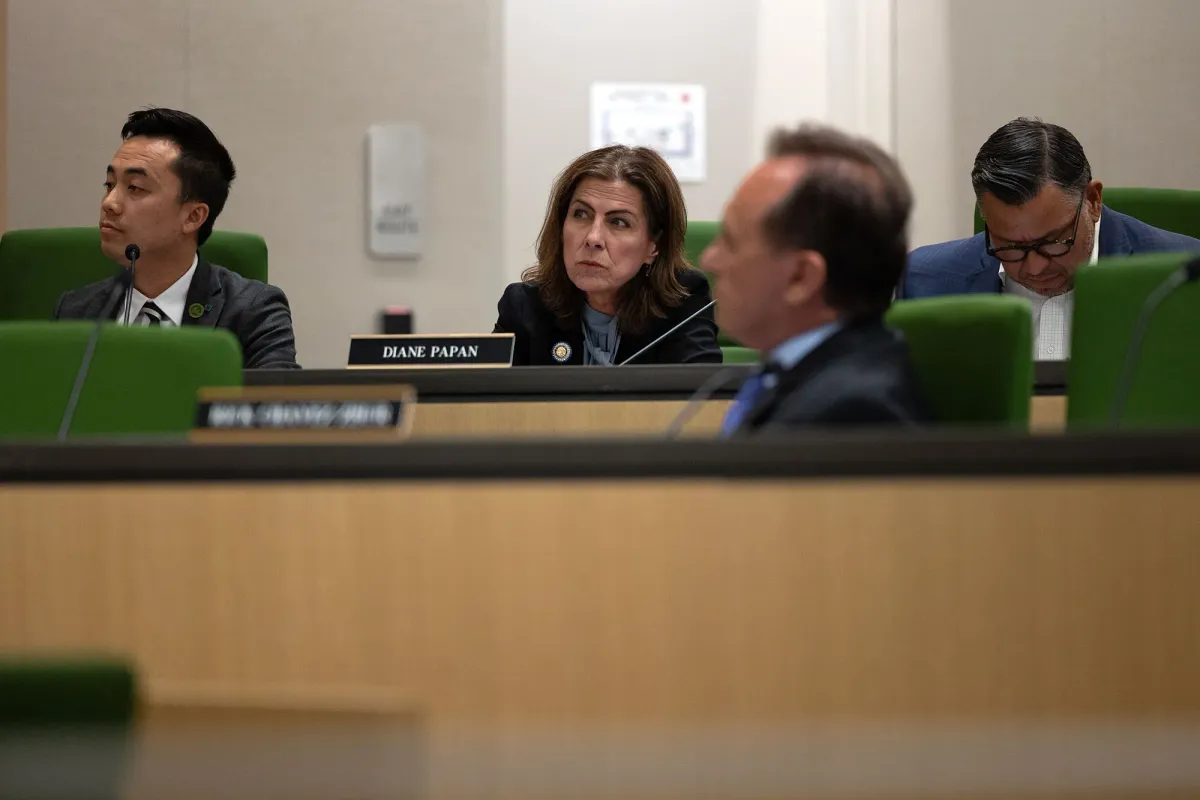
This story was originally published by CalMatters. Sign up for their newsletters.
Ashley Paschen believed she had a strong case as she sought a restraining order against her ex-husband.
She alleges she had proof he hurt her, and she had “nanny camera” footage that she alleges showed him beating her stepson. But a San Diego County court commissioner refused to admit the video footage as evidence and ruled that her abuse claims weren’t credible.
She wanted to appeal the decision, but no attorney would represent her because no one transcribed her court hearings. Court reporters simply weren’t available for all of her court dates. Without a written record “it makes it virtually impossible to win an appeal,” one attorney told her.
It’s a common occurrence in California. Since 2023, more than 1.7 million family law, restraining order, probate and other civil proceedings have had no written transcriptions, according to the Judicial Branch of California.
That’s because there’s a statewide shortage of certified court reporters. When no reporters are available, state law, with a few exceptions, bans recording in courtrooms, even though many courts have recording devices. Having a recording would give parties in a legal dispute the option of later having a hearing transcribed by a certified professional.
“It’s absolutely outraging (if) it’s that easy to, you know, flip a switch and be able to record,” Paschen said.
Nonprofit legal aid groups filed a petition late last year urging the California Supreme Court to overturn a ban on recording cases such as Paschen’s.
The petitioners argue that Californians’ constitutional rights to appeal are being violated, and the ban on recording in courtrooms creates a “two-tiered” system of justice. Wealthy litigants, the petitioners say, have the option of hiring private court reporters to sit in on their hearings and type up a written record. But people who can’t afford the more than $3,000 a day to hire a contract reporter are at the mercy of an understaffed court system.
Most states and the federal courts use recording technology more than California does, some exclusively in lieu of court reporters. Only Texas and New York restrict the technology to the extent California does, according to the Judicial Council of California.
Now, with the state Supreme Court’s ruling pending, the unions representing court reporters have urged the court to uphold the recording ban. At the same time, the union is pushing for legislation that will temporarily allow recording in cases like Paschen’s. If it passes, it could conflict with the court’s decision.
And critics say the union’s bill might make the problem worse.
Influential SEIU pushes for bill
San Mateo Democratic Assemblymember Diane Papan’s Assembly Bill 882 would lift the ban on recording in civil cases for three years to give the courts time to hire more reporters and ease the shortage.
“This bill is about access to justice,” Papan told her colleagues on the Assembly floor early this month. “It will ensure that a record of civil proceedings is available when a litigant cannot afford to hire a court reporter.”
Papan didn’t return interview requests; neither did a lobbying representative for the most influential labor organization behind the bill, Service Employees International Union. SEIU has donated at least $62,300 to Papan since 2021, according to the CalMatters’ Digital Democracy database.
Critics say unions put so many restrictions into Papan’s measure that it doesn’t go nearly far enough to solve the problem – and could even make it harder to turn on a recorder inside a courtroom.
The proposal would require parties in a case who cannot afford to retain a private court reporter to request in writing a recording at least a day before a hearing, an option that those without an attorney are unlikely to know about.
Court reporters also could turn down an assignment in another courtroom, even if it’s in the same building. For instance, a court reporter stationed in a family courtroom would not be required to cover a felony criminal trial, even if the lack of a court reporter would cause the case to be dismissed.
Earlier versions of the bill, which easily passed the Assembly this month, had more restrictions, including prohibiting courts from buying or leasing recording equipment.
Unions that represent court reporters that got the ban on court recording passed in the first place have fought previous legislative efforts to expand use of the technology. In 2023, the unions succeeded in killing the bill which would have allowed recording in all civil proceedings.
Had it passed, the legal aid groups wouldn’t have needed to ask the California Supreme Court to decide the matter. In a brief opposing the pending Supreme Court case, SEIU and other court reporter unions argued the Supreme Court wasn’t the appropriate venue and that the Legislature and trial courts are working to solve the problem.
The court reporter dispute is the latest example of the political power labor unions wield in the Legislature.
As CalMatters has reported, organized labor, which represents around one-sixth of the state’s workforce, regularly gets its way on bills at higher rates than other prolific lobbying groups, due in part to the massive political spending by unions.
SEIU is one of the most politically influential unions. Since 2015, SEIU and its affiliates have donated at least $20.6 million to members of the Legislature, according to the Digital Democracy database.
“The union representing court reporters has been a particularly effective union in protecting their interests,” said Clark Kelso, a professor at University of the Pacific McGeorge School of Law.
Despite good pay, positions go unfilled
Court reporters argue that because they guarantee that their transcriptions are 100% accurate, they’re the only method of ensuring no one loses a case because something said during a hearing is written down wrong.
Court reporters can ask a witness to speak up, slow down or repeat their words if they’re hard to understand. Without human beings doing that, transcriptions can end up incomplete or inaccurate, the bill’s proponents say.
“The state of California demands justice be fair and accurate,” Stacy Gaskill, a court reporter from San Mateo County, told the Assembly Judiciary Committee in April. “That can only be met if court records are verbatim and complete.” She said court reporters are held to such high standards they can be charged with a crime for certifying inaccurate transcripts.
While most agree that human court reporters are the gold standard, those pushing for expanded recording in courtrooms argue that there aren’t enough new court reporters to offset the number of retiring workers – a problem causing ripple effects throughout the judicial system. Around 4,600 court reporters are licensed in California, most of them not court employees. That’s down from 7,500 in 2010. Around half of them were eligible for retirement in 2023, according to the last available statistic from the judicial branch.
The most serious cases, such as felony criminal proceedings, get priority for a court reporter, leaving other hearings without a written record on busy days. Almost all of California’s major civil cases go without one; more than half of all family law and probate cases have no reporter present, according to the judicial branch.
“The inability to create a verbatim record limits people’s ability to appeal significant and life-changing decisions regarding child custody, paternity, conservatorship assets, and more,” the judicial branch says on its website.
Legal organizations that filed the petition with the Supreme Court say it’s often not known whether reporters are available until the day of the hearing. This forces attorneys and their clients to decide to delay their cases or risk that they won’t need a written record during an appeal.
“Even when a continuance is a viable choice, it may be repeated, dragging out proceedings for many months or even years,” the aid group, BayLegal, wrote in the petition.
The shortage comes despite the Legislature’s approval of $30 million to lure new hires for the well-paying job.
The median pay with benefits for a court reporter in California is more than $200,000, according to the judicial branch. Plus, by law, transcripts of hearings must be purchased from court reporters who get to keep the money. During the last fiscal year, California courts spent $23.7 million paying court reporters for transcripts, according to the judicial branch.
But even with the job’s financial perks, courts are struggling to hire. Los Angeles Superior Court is offering a $50,000 signing bonus and $25,000 finder’s fee for court employees who refer a court reporter. Despite the incentives, L.A. County has 106 vacant court reporter positions, according to an online dashboard the superior court created to highlight the problem.
Hiring has stepped up statewide, but courts still need an estimated 428 new full-time court reporters to catch up, according to a statewide dashboard.
Could AI replace court reporters?
It’s hardly surprising that courts are struggling to find enough reporters, said Lorin Kline, director of advocacy for the Legal Aid Association of California, one of the groups pushing for expanding the use of recordings in courtrooms.

Kline said court reporters are likely to make more money working as private contractors, and younger applicants may recognize that artificial intelligence transcription technology could replace their jobs in a few years.
“Not only is it a profession with potentially a questionable future because of technology,” Kline said, “working in the court itself isn’t necessarily the first job that a court reporter wants to get because they can make more money working elsewhere.”
Neither the petition before the Supreme Court nor the bill to temporarily allow more recordings refer to AI transcription software. For now and the immediate future, to appeal a case, a transcript from a recorded hearing must be prepared by a pro.
Some experts say AI is not the answer to the court reporter shortage — and will never be.
“Humans just do language imperfectly all the time and in unpredictable ways… and they make mistakes,” said Nicole Holliday, an associate professor of linguistics at UC Berkeley. “But here’s where they have the edge over any automated system: They can pause and ask for clarifications. They can improve their training.”
She said AI transcription systems have been trained to transcribe speech based on how English is spoken by a subset of the population that’s typically white and wealthy. The software is not even close to accurate for the diverse accents spoken in America today, Holliday said.
Others see promise as the technology improves and if it’s deployed responsibly, including Camille Crittenden, executive director of UC Berkeley’s Center for Information Technology Research in the Interest of Society and the Banatao Institute.
She called the technology “potentially transformative for the judicial system,” giving poor people the same access to justice while achieving “all kinds of cost savings.”
“I know that the union doesn’t want to hear that,” she said. “But for the courts overall, that would seem like a positive outcome.”

